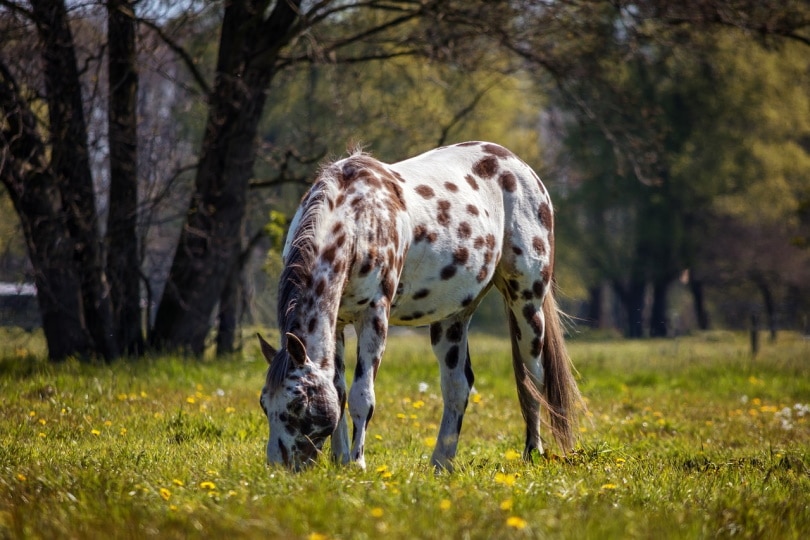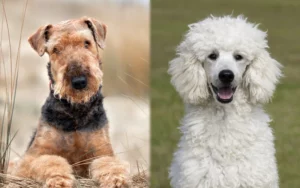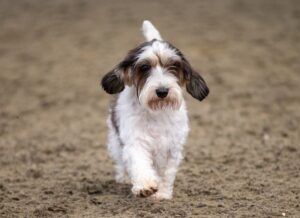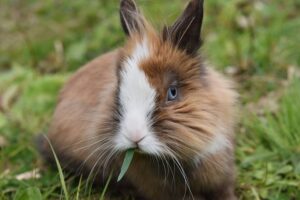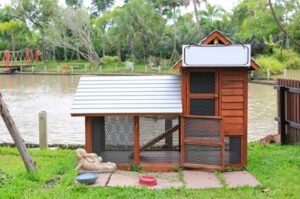Click to Skip Ahead
Horses are truly majestic animals, but few are more eye-catching than the Appaloosa. With their unique spotted coats, high intelligence, “can-do” attitude, and, of course, their long and fascinating history, it’s no wonder the Appaloosa is so popular. In this guide, we’ll share all you need to know about these beautiful and spirited horses
Breed Overview
| Care Level | Moderate |
| Temperature | Both cold and warm climates |
| Temperament | Intelligent, loyal, friendly, spirited, brave, independent |
| Colors | A wide variety of colors and patterns are possible, including black, brown, dun, cremello, chestnut, grulla, bay, dark bay, roan, blue roan, & red roan (colors), and leopard, snowflake, blanket, blanket with spots, marble, & roan blanket |
| Lifespan | 25–30 years |
| Weight | 950–1,200 pounds |
| Height | 14.2–16 hands |
The Appaloosa is a real gem of a horse, much loved for possessing some wonderful character traits in addition to being strikingly beautiful. Popular with horse lovers of all levels of experience, from complete beginners to seasoned pros, the Appaloosa can often be found taking part in events and sports, but also being leisure ridden and pampered by their devoted families.
Appaloosa Horse Characteristics
Appaloosa Horse Characteristics

What Are The Appaloosa Horses Used For?
The athletic, fast, and relatively lightweight Appaloosa, with the right training and socialization, is well-adapted to a wide variety of disciplines in addition to life as a family companion and riding horse. Appaloosas participate in a number of events including dressage, racing, endurance riding, show jumping, polo, and parades. These are the kinds of horses that excel in pretty much everything they do.
In addition, Appaloosas are popular horses for ranchers thanks to their versatility, speed, intelligence, high level of trainability, and pleasant, eager-to-please personalities. Those looking for a family horse may also consider an Appaloosa because they’re famous for being great beginner horses for both children and adults alike.
Just bear in mind, however, that every horse has their own personality, so you’ll need to get to know the Appaloosa before deciding whether you’d be a good fit for each other.
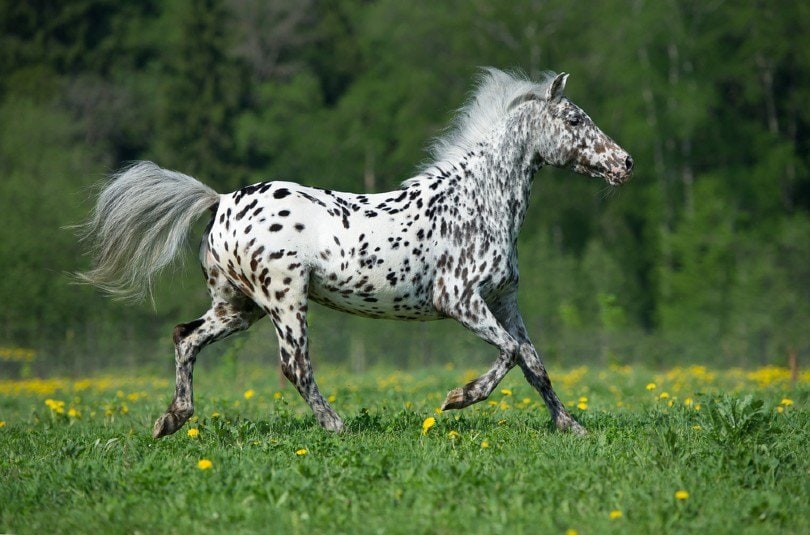
Where Did The Appaloosa Horse Originate From?
Spotted horses can be traced back many thousands of years, and scientists have proven that they once populated ancient Europe. The image of white horses with black spots can be seen in cave paintings in Southern France that date as far back as 25,000 years.
The history of the Appaloosa breed, however, dates back hundreds of years rather than thousands. When Spanish explorers came to North America in the 15th century, they brought their horses with them.
The Nez Perce tribe, whose homelands have historically included Idaho, Washington, Montana, and Oregon, later bred the Appaloosa with the goal of developing a horse that was highly intelligent, trainable, and fast. In the late 19th century, the Appaloosa’s infamous speed was put to good use in the Nez Perce War.
Appaloosas were originally called “Palouse horses” in reference to the Palouse region and went through a few chances before “Appaloosa” was settled on.
Temperament & Intelligence of the Appaloosa Horse
The Appaloosa is well-known for being an intelligent, quick-to-learn, and trainable horse, which accounts for why they’re selected to participate in so many disciplines in addition to being popular family horses. They often possess a nice balance of personality traits; on one hand, they’re commonly described as being energetic, athletic, spirited, and independent, but they’re also famously gentle, friendly, and willing.
Appearance & Varieties
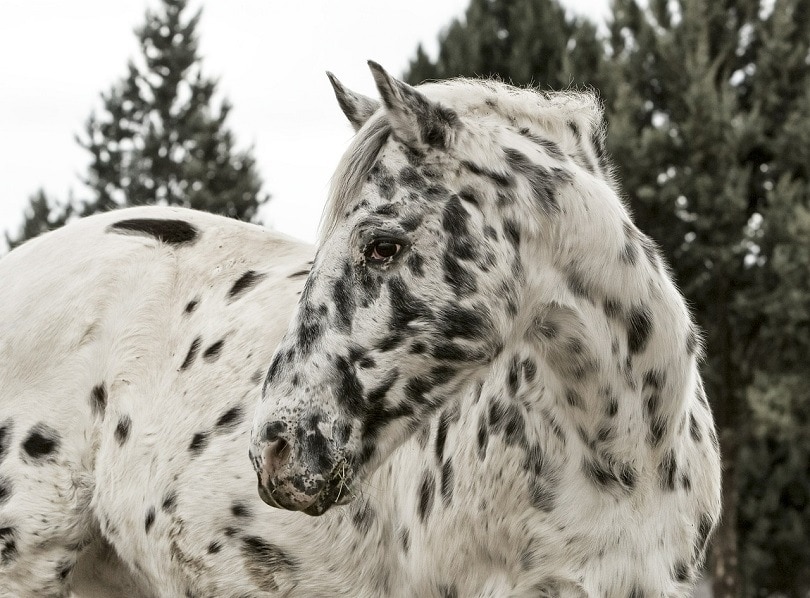
One of the most fascinating Appaloosa traits is that their spotted coats vary greatly in terms of spot distribution, location, and color. While some, like those with leopard patterning (white with dark spots), are spotted all over, some have what’s called “blanket” patterning.
Blanket-patterned Appaloosas have a large, white (or roan, in some cases), blanket-like marking on the hips that can either be solid or contain spots. Snowflake Appaloosas, on the other hand, have dark-colored coats flecked with white spots or splashes.
Mottling can be found on the Appaloosa’s nose, genitals, lips, and around the eyes, and you can see distinctive striping on the hooves. Another physical characteristic you may spot in Appaloosas is a noticeable white sclera, which is more obvious than it is in other types of horses. Some Appaloosas have a sparse mane and tail, traits originally developed by the Nez Perce tribe.

Things to Know When Owning an Appaloosa Horse:
Habitat & Stable Requirements
The Appaloosa is a versatile and hardy horse that typically does well living outdoors, providing they have a dry shelter to retreat to, enough hay to keep them going, and are blanketed when the weather gets too cold, windy, or rainy (remember to blanket before the horse goes out in the rain rather than while they’re wet).
Blanketing is especially important for clipped, sick, underweight, or old horses and those that are acclimatizing to a new, colder climate than they’re used to. Horses shouldn’t be confined to stables for long periods of time, but some choose to stable their horses for some of the time, for example, overnight.
If you stable your Appaloosa, their stall should be kept clean and well-ventilated because germs and dust can make them sick.
Food & Diet Requirements
Your Appaloosa will need a good deal of roughage to keep their digestive system working as it should. This can be provided either by offering hay (if your horse spends some time in a stable) or ideally letting them graze in the pasture (be sure to check for and eliminate toxic plants). As a general guideline, the daily amount of roughage should be one to two percent of their body weight.
Some horses are fed small amounts of grain in addition to roughage, but this is only necessary if, for whatever reason, the horse cannot access enough hay or pasture. If you feed grain, it should be in small and frequent amounts to match the horse’s natural eating habits. Provide clean water at all times.
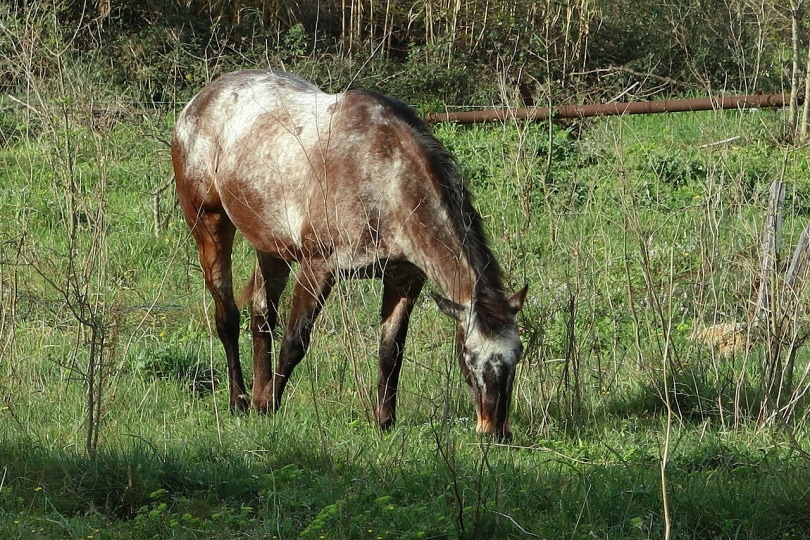
Exercise
In a spacious enough pasture, horses get plenty of exercise by moving around when grazing and interacting with other horses. Horses naturally exercise themselves in a slow and steady manner but, of course, riding is another great form of exercise for them. Methods of exercising a horse without riding include lunging, in-hand walking, stretching, in-hand agility, free-schooling, and more.
If your Appaloosa spends some of their time in a stable, it’s crucial to make sure they get enough time out in the pasture so they can perform their natural behaviors and get exercise. If your horse goes out to pasture alone, however, they’re less likely to move around a lot—it’s best if they can share the pasture with other horses.
Training
Appaloosas are renowned for their intelligence, trainability, and strong work ethic, traits that make them fairly easy to train, especially for those with experience.
Horse training involves various exercises including groundwork, socializing your horse to make sure they’re comfortable in all different types of situations, acclimatizing your horse to wearing a saddle and being ridden, and, most importantly, building a bond and earning your horse’s trust.
Appaloosas are the kinds of horses that enjoy forging close bonds and will typically respond well to training as long as they’re working with a respectful and confident leader. On the other hand, if these horses feel disrespected or don’t trust you, they will dig their heels in and can be stubborn as mules.
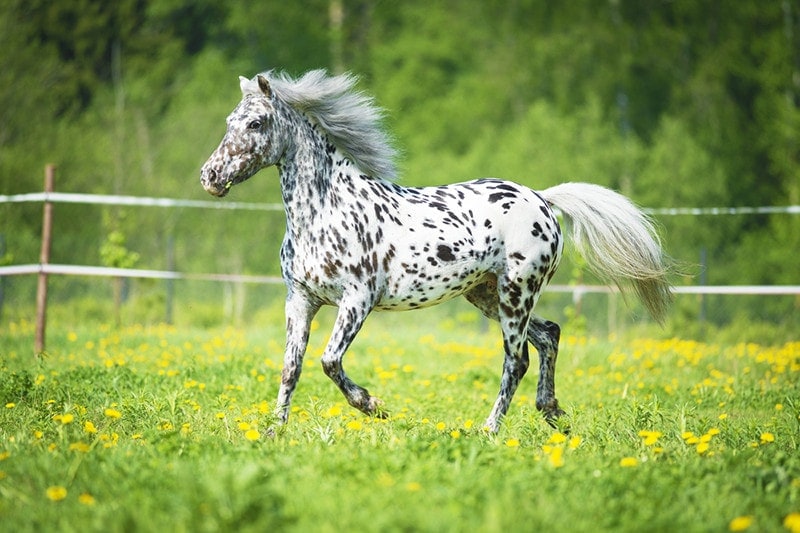
Grooming
Brushing your Appaloosa’s coat helps keep both the coat and skin in good condition. If your horse is stabled or wears a rug often, they’ll require daily brushing to keep their coats as dirt-free and tangle-free as possible. If they live outdoors in a pasture, horses tend to groom one another, so you likely won’t need to groom a pasture horse as often.
It’s also a good idea to check your horse’s hooves every day to make sure there are no signs of infection. It’s ideal to pick out the feet daily, if possible, to maintain good hygiene.
Lifespan & Health Conditions
Though Appaloosas are quite sturdy horses with a good average lifespan (25–30 years, though some live to 35 years), there are certain conditions that they could inherit or that could affect them at some point, especially eye conditions. These include:
- Mild Common Cold
- Equine Recurrent Uveitis (ERU)
- Congenital Stationary Night Blindness (CSNB)
- Hyperkalemic Periodic Paralysis (HYPP)
- Parasites
- Sunburn
Male vs Female
In terms of physical appearance, male Appaloosas may be slightly bigger and heavier than females, but Appaloosas, in general, tend to fall between 14.2 and 16 hands, which puts them in the medium-size category. A male Appaloosa might also appear slightly more muscular than a female.
In terms of personality, males are generally considered to be more predictable and perhaps less sensitive than females, as females have a tendency to become more unpredictable and prone to mood swings when in season.
However, horses are complex when it comes to personality, and gender can’t determine which horse you will gel with most. Both male and female Appaloosas can make fantastic companions regardless of gender—you can’t predict what an individual horse’s personality is like without getting to know them.
3 Little-Known Facts About the Appaloosa Horse
1. Solid Appaloosas Are Also Possible
Though Appaloosas are famed for their spotted coats, not every Appaloosa is spotted—some are solid. Solid Appaloosas that meet certain criteria, however, may still be registered with the ApHC.
2. Approximately 10,000 Appaloosas Are Registered Annually
According to information from Oklahoma State University, the ApHC registers around 10,000 new Appaloosas yearly, and there are over half a million Appaloosas on record.
3. The Appaloosa is Idaho’s State Horse
This doesn’t come as a surprise, since the Appaloosa has such a rich history within the state thanks to the Nez Perce tribe.
Conclusion
Not only are Appaloosas the perfect companions for many horse parents, but they’re also very historically and culturally significant, especially in Idaho and its surrounding states. We have the Nez Perce tribe to thank for the development of this magnificent horse that still today has a special place in the hearts of horse lovers the world over.
- https://www.appaloosamuseum.org/spotting-patterns-in-appaloosas/
- https://www.science.org/content/article/was-spotted-horse-imaginary-creature
- https://www.pbs.org/wnet/nature/blog/american-horses-horses-in-north-america-a-comeback-story/
- https://aphcuk.org/appaloosa-characteristics/https:/hqmagazine.co.za/askhq-appaloosa-mane-and-tail/
- https://appaloosainfo.weebly.com/maintenance-requirements.html
- https://www.webmd.com/pets/what-to-know-about-the-appaloosa-horse
- https://kb.rspca.org.au/knowledge-base/how-much-should-i-exercise-my-horse/
- https://www.bhs.org.uk/horse-care-and-welfare/health-care-management/hoof-care/routine-hoof-care/
- https://www.rspca.org.uk/adviceandwelfare/pets/horses/diet
- https://www.horseillustrated.com/horse-breeds-a-field-guide-to-appaloosa-coat-patternshttps:/www.helpfulhorsehints.com/appaloosa-horse-facts/
- https://www.cnn.com/2013/06/28/sport/horse-racing-male-female/index.html
- https://thehorseandstable.com/uncategorized/appaloosa-horse-guide/
- https://www.petmd.com/horse/breeds/c_hr_appaloosa
Featured Image Credit: Seaq68, Pixabay

